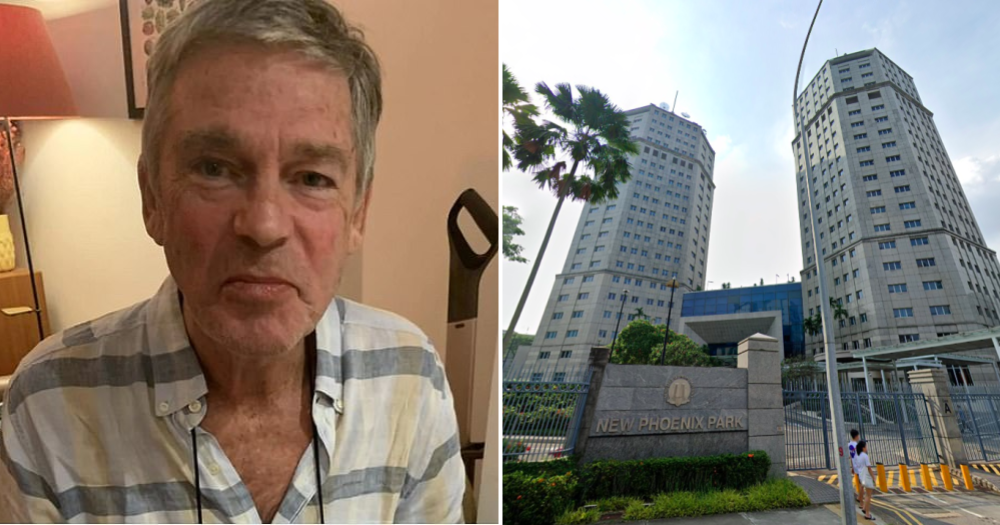U.K. newspaper The Daily Telegraph published a story on Oct. 18 with the headline, "Amber Sceats’ father Phillip Sceats escapes cocaine death row hell".
The article reported on the plight of Phillip George Sceats, father of Australian jewellery designer and socialite Amber Sceats, who was allegedly framed, caught in Singapore, and detained for 353 days from Mar. 2018 to Feb. 2019.
MHA responds
Responding to media queries, the Ministry of Home Affairs (MHA) confirmed on Nov. 1 that Sceats was in fact arrested here after cocaine and methadone — both controlled substances — were found in his luggage during checks at Changi Airport.
MHA said that Sceats was let off with a "stern warning" for possession of methadone, and granted a discharge not amounting to acquittal for a charge of cocaine importation.
MHA also responded to Sceats account of the conditions in which he was remanded, rebutting claims that he was housed together with death row inmates in cells where the lights were never turned off, that he had only 20 minutes' freedom each day, and that inmates are caned if they "do something wrong".
How were drugs found in Sceats' luggage?
According to the The Daily Telegraph, Sceats was on a layover in Singapore, en route to Langkawi for a "surprise holiday" on Mar. 7, 2018.
The U.K. newspaper reported that 90g of cocaine were found in his luggage.
MHA's statement, however, states that the amount of cocaine found was 39.4g.
A person convicted in Singapore for unauthorised importation of 30 grams or more of cocaine can be sentenced to death, under the second schedule of the Misuse of Drugs Act.
The Daily Telegraph also reported that Sceats was carrying methadone, but said that he had a prescription for the medication, which is commonly prescribed for opioid dependence.
MHA revealed that a total of 72 methadone tablets were found in two of Sceats' bags, and pointed to the fact that cocaine and methadone were both controlled substances.
According to the Health Sciences Authority website, those with personal medication containing methadone must apply for approval to bring it into Singapore at least 10 days before their expected arrival.
Why was Sceats singled out for bag checks?
The Daily Telegraph quoted Sceats as saying that after getting past the immigration desks at Changi Airport, he was walking to pick up his baggage when he was called back by Singapore officials, who addressed him by name.
They then took him to the baggage carousel and asked him to point out his suitcase.
MHA explained that Sceats was stopped "based on information received" that he was "involved in drug activities".
Detention and discharge
After nearly a year of being held in remand, Sceats regained his freedom on Feb. 21, 2019.
Was Sceats framed?
Sceats was quoted as saying that the drugs were not well-hidden and seemed to have been "meant to be easily found".
He made a formal statement denying that he knew about the cocaine in his luggage, and claimed that he had been framed.
According to The Daily Telegraph, investigators at Singapore's Central Narcotics Bureau were "looking into the strange situation" of a wealthy businessman smuggling cocaine out of Australia, although it would be worth much more there than in Singapore or Malaysia.
Sceats also claims to have passed a lie-detector test as part of investigations, and said that his phone records did not disclose evidence that he had been liaising with people to deliver the drugs.
Meanwhile, MHA said that Sceats was let off with a "stern warning" for possession of methadone, and granted a discharge not amounting to acquittal for a charge of cocaine importation.
MHA did not elaborate on the reasons for the discharge, however.
Claims about being held in remand
Sceats' account of the conditions in remand, included several claims that MHA rebutted.
The Daily Telegraph reported that Sceats was housed together with death row inmates, and "watched helplessly" as his cell mates were "taken away one by one to face execution".
MHA says, however, that he was "never housed together with inmates on death row", and was instead "kept in a separate area meant for remanded persons at Changi Prison".
He also claimed that he had only 20 minutes' freedom each day, and was held in a cell where the lights were never turned off.
He was quoted as saying: "They don’t turn the lights off when you are on the death penalty."
On the other hand, MHA says that Sceats was "accorded an hour of daily out-of-cell-time", as was the norm for "all inmates in remand" and that the cell's lights would "automatically switch off at night".
Sceats also reportedly claimed that inmates are caned if they "do something wrong".
MHA explained that caning was "only for serious offences committed by inmates, such as aggravated or repeated assault on another inmate or assaulting a prison officer", and pointed out that those subject to the punishment must be certified medically fit.
We deliver more stories to you on LinkedIn
Top image via The Daily Telegraph and Google Maps street view
If you like what you read, follow us on Facebook, Instagram, Twitter and Telegram to get the latest updates.
